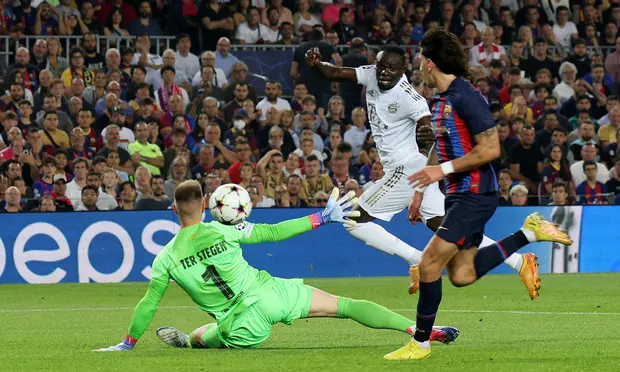Barcelona’s players sat beneath the stand and watched their Champions League campaign come to an end, then ran out on to the pitch and demonstrated some of the reasons why. Already eliminated when this game began, witnessing any last, tiny hope extinguished on the television where Internazionale beat Viktoria Plzen in the early kick-off, they were not even able to have a bit of fun before bidding farewell, nor leave much to remember them by. Instead, they head into the Europa League with a 3-0 defeat, their sixth in a row against Bayern Munich. Aggregate score: 19-2.
Who knows: maybe if it had mattered, it would have been different. Maybe watching their own execution immediately beforehand was not the greatest idea, either: “Being knocked out before the game affected us,” Xavi said. And this is Bayern too, a “super team” in his words. But ultimately Barcelona brought about their own demise, left feeling this level is still beyond them, so soft is their underbelly. “We’re a young team and we don’t yet have enough to compete in the Champions League,” Pedri said.
Barcelona had not managed a single shot on target. Even when Robert Lewandowski thought he had a penalty before half-time it was not to be, the ball taken from him on the spot, Anthony Taylor consulting the VAR and deciding he had dived – which spoke of frustration, the impotence that defined them. Him too, unable to score in either meeting with his former club.
In any case it was already done, confirmation of what Barcelona had known from the start of the day: that their fate would be decided on a far away field. Or, perhaps more accurately, already had been, even then. That said, on this evidence having it in their own hands wouldn’t have been any better.
In Munich and Milan, Barcelona had moments but were beaten, those defeats followed by an error‑strewn 3-3 draw with Inter that left Barcelona facing the abyss and Xavi calling the competition “cruel”. They had to win their remaining two games and needed Inter not to win either of theirs.
“Hope is the last thing you lose,” Xavi had said, but it was the first.
Inter faced the side who had lost all four matches and conceded 16, Barcelona’s players called in to watch it together. It was not great motivation: before half-time, the Italians were two ahead; exactly as Barcelona ran out to warm up, they scored their fourth. It was over, they knew. Time for Europe’s second tier.
Xavi tried to avoid the word failure but the Europa League is not the place Barcelona are supposed to be. Not the place they budgeted for, either – still less for a second season running. The last manager to take charge of two consecutive years in the Uefa Cup here was Terry Venables. If last year was a reflection of their reality – “it is what it is,” to use Gerard Piqué’s words – this was supposed to be different, which made it hurt more.
Barcelona cannot afford this, certainly. At a time when every euro matters, this early exit costs around 20 million of them, plus knock-on effects.
There is an emotional element as well: the (in)famous levers pulled, multiple signings made and assets sold were a risk designed to begin a virtuous cycle. Instead, Barcelona have been knocked out earlier than at any time in 24 years, gone with a game to go. Two games, in fact.
Nor could they enjoy the first of those, or offer hope for the future, Serge Gnabry slipping in the knife. Just nine minutes had passed when he sent Mané away from Héctor Bellerín to clip in the opener and on the half hour he did it again, rolling the ball into Choupo-Moting to score. At the death, he hit a volley that Pavard turned in for the third, and his third assist. Gnabry had thought he had scored one of his own earlier, only for it to be ruled out, but it didn’t matter. Ultimately none of it did, over before it had started.
Source: The Guardian



